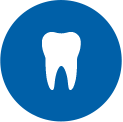 If you’ve never heard of TMJ, TMJ dysfunction, or TMD, you’re not alone. However, in order to provide diagnosis for patients suffering from this oral health conditions, patients need to be informed about the warning signs and risk factors associated with this oral health condition. TMD occurs when the small temporomandibular joints (TMJ) connecting the jaw and skull bone are damaged. TMJ dysfunction is a difficult condition to pin down. A dentist’s best bet when it comes to making an accurate diagnosis, is for a patient to understand and monitor changes in jaw function that indicate they may suffer from TMD and contact their dentist to receive an evaluation. Keep reading to find out more about some of the warnings signs and risk factors associated with TMJ dysfunction.
If you’ve never heard of TMJ, TMJ dysfunction, or TMD, you’re not alone. However, in order to provide diagnosis for patients suffering from this oral health conditions, patients need to be informed about the warning signs and risk factors associated with this oral health condition. TMD occurs when the small temporomandibular joints (TMJ) connecting the jaw and skull bone are damaged. TMJ dysfunction is a difficult condition to pin down. A dentist’s best bet when it comes to making an accurate diagnosis, is for a patient to understand and monitor changes in jaw function that indicate they may suffer from TMD and contact their dentist to receive an evaluation. Keep reading to find out more about some of the warnings signs and risk factors associated with TMJ dysfunction.
How Will I Know I Have TMJ Dysfunction?
TMJ dysfunction is often misdiagnosed or undiagnosed for years. The warning signs of this disease are varied and can be difficult to assign to one oral health concern. However, if you’re aware of the wide range of symptoms, you may be able to help a dentist make an accurate diagnosis in the earlier stages of this condition. Let a dentist know right away if you experience any of the following warning signs of TMJ dysfunction:
- Jaw pain – can be a chronic, throbbing pain or stabbing pain during jaw movement
- Head, neck, shoulder, or back pain
- Clicking or grinding sound when opening and closing the mouth
- Limited jaw mobility or complete lock jaw
- Earache or ringing in ears – can lead to hearing loss in severe cases
What are the Risk Factors for TMJ Dysfunction?
Patients are much more likely to suffer from TMD, if they already struggle with stress or anxiety. While these may seem like cognitive health concerns, stress impacts the body dramatically. During times of anxiety, people are more likely to clench their muscles leading to strain. This includes clenching the jaw. Unconscious, chronic teeth grinding and clenching, bruxism, is another risk factor for TMD. Most bruxism sufferers grind their teeth during sleep, so it’s important to protect the smile and jaw joints from unnecessary damage that can occur as a result of bruxism. A misaligned bite can also lead to strained or damaged TMJ as uneven pressure is placed on teeth and jaw joints.
What Can I do About my TMJ Dysfunction?
First, call Berquist Family Dentistry. Our Crown Point dentist will examine your jaw function and help you determine whether or not you’re suffering from TMJ dysfunction. If we do diagnose TMD, we can offer a variety of treatments to relieve jaw pain and restore full and unimpeded movement of your mouth. TMD sufferers can struggle to perform the simplest task like sharing a smile or saying hello, but there are treatments to renew oral health and function if you’re one of these patients.








